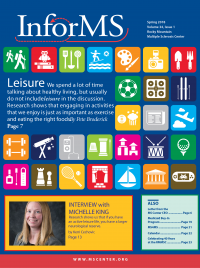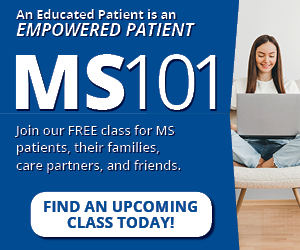In 2018, the Rocky Mountain MS Center is excited to celebrate our 40th Anniversary. Throughout the year, we will be sharing with you some of the significant events, developments and milestones that have brought us to where we are today. In this issue, we’ll set the stage for our year-long anniversary celebration with a brief history of the organization.
N. Daren Writer was diagnosed with MS in 1974. At the time, he was told “there’s nothing anyone can do about MS,” and that he should “go home and put your affairs in order.” This wasn’t an answer that Writer would accept, so he sought out Dr. Jack Burks, a neurologist who was dedicated to finding the cause and best treatment options for MS. Together, Writer and Burks formally established the Rocky Mountain MS Center in 1978.
The RMMSC was initially affiliated with the University of Colorado Health Sciences Center and the Denver Veteran’s Administration Medical Center. From the beginning, the MS Center conducted basic science research. In the first years of operation, scientists isolated a corona virus from MS brain tissue. Using that virus, they subsequently produced animal models of demyelinating disease.
In 1988, the RMMSC moved to the campus of Swedish Medical Center, just south of Denver in Englewood. By 1992, the MS Center had broadened its continuum of care by merging with MS Community Resources — formerly known as the MS Society of Colorado-Denver. This merger added to the significant clinical work of the MS Center through enhanced community services, like hydrotherapy and a specialized adult day program — the RMMSC’s King Adult Day Enrichment Program (KADEP).
When KADEP opened, it was quickly obvious the RMMSC had discovered a huge unmet need in the community. KADEP’s services were in such demand that the program expanded and relocated just two years after its establishment.
In 1993, Rocky Mountain MS Center scientists identified a particular immune cell (a specific T cell) in the spinal fluid of newly diagnosed MS patients. This contributed to the mounting evidence that T cells are involved in orchestrating the onset of MS.
With a track record of pioneering research and advancements in our understanding of MS, the MS Center was chosen as a testing site for most of the major clinical trials that explored treatment interventions for people with MS. Based on those and other studies in the early 1990s, it became possible to directly treat the disease, not just manage the symptoms. These immune-modulating medications – Disease Modifying Therapies (DMTs) — alter immune system function in ways that slow the progression of MS.
In 2008, the MS Center joined with the University of Colorado and the University of Colorado Hospital to create the Rocky Mountain MS Center at University of Colorado. By bringing together the experience and exceptional work in patient care and cutting-edge research that have distinguished these organizations for many years, we have created a world-class and comprehensive center for patient care and research that serves the Rocky Mountain region and has a national and international reach.
The Rocky Mountain MS Center is also home to the Brain and Tissue Bank. This brain and tissue bank was one of the first and remains one of the largest in the world. The bank supplies MS tissue samples to scientists and researchers throughout the world who conduct MS research.
In 2010, the MS Center purchased a former elementary school located in Westminster. The King Adult Day Enrichment Program and MS Center administrative offices relocated to the building after many renovations. The new 30,000 sq. ft. facility includes a fully accessible fitness center, computer lab, outdoor gardens, and a full-size gym.
Today, the MS Center continues to attract national recognition for its programs and initiatives. MS is more than a medical diagnosis and people living with the disease and their families need more than traditional medical intervention. Patients, caregivers and the community rely on the Rocky Mountain MS Center for comprehensive treatment, professional resources, and information on the latest research advances.
We invite you to show your support and recognize our 40th Anniversary with a $40 gift. For roughly the price of a tank of gas, you can show your commitment to the RMMSC and join others in securing our sustainable future. To do so, head to MSCenter.org/donate and choose the “40 for 40” option. You may also choose to heighten your impact by making a recurring monthly gift – just select the appropriate option and join our Evergreen Partners, who’ve made monthly pledges to the RMMSC.






